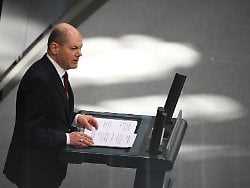The Federal Chancellor reacted to the Russian attack on Ukraine with a reorientation of German foreign and defense policy. He is taking a risk, also because the numerous announcements raise no less important questions.
A lot of right things were said in the special session of the German Bundestag on the Russian war against Ukraine, which is largely a consensus among MPs. For example, that the aggression comes from Vladimir Putin alone. Or that the Russian leadership is not to be equated with the Russian people. That after this brutal attack on a peaceful and sovereign country in the heart of continental Europe, nothing will be the same. The attack on Ukraine marked a “turning point,” declared Chancellor Olaf Scholz in a speech that is already clear that it will remain one of the most important of his new chancellorship. And then he did something unexpected: he assumed the leadership he had promised during the federal election campaign.
The federal government wants to invest an additional 100 billion euros in the Bundeswehr in the coming years. Germany will purchase suitable fighter jets for remaining in nuclear sharing as well as Israeli combat drones. And: Germany is now supplying weapons to the Ukrainians, who, for their own survival and freedom, have to fend off Russian soldiers – injuring and killing them. Vice-Chancellor Robert Habeck raised the question of whether Germany might now “supply arms in a permanent land war”. He doesn’t know the answer, neither does Scholz.
Germany, as became clear this Sunday, faces an uncertain future, just like the rest of Europe. The suffering of Ukraine is great and must be stopped. But Scholz’s speech sent an even bigger signal: Germany and Europe must prepare for a protracted conflict with a neo-imperialist Russia – literally. The factions of the SPD and Greens, with their many peace-loving, often army-skeptical MPs, were surprised by the announcement of a massive rearmament program by the traffic light government they support.
Procrastination was not an option
Already on the question of arms deliveries, many elected representatives had to throw old convictions overboard within days. Many Social Democrats and Greens have so far refused to spend more than 2 percent of gross domestic product on defense out of deep conviction. Especially since the many problems of the Bundeswehr are not only of a financial nature. A large part of the Greens base does not want armed drones for the Bundeswehr. And with SPD parliamentary group leader Rolf Mützenich, Scholz has had a particularly prominent opponent of nuclear participation in his own ranks.
The otherwise rather deliberative Scholz, who thinks through all decisions three times and sends them through four voting loops before they become public, takes the risk. Ironically, in questions of particularly high explosive power for the traffic light, he is now forcing the MPs to line up behind him. It is not certain that they will do so.
With his “turning point” in German security policy, Scholz set standards against which the public and opposition will measure him. But because doing nothing or procrastinating were not options, because Germany needed leadership at a historic moment of general uncertainty, Scholz had to deliver. Time will tell what the strong words are worth in the long term.
